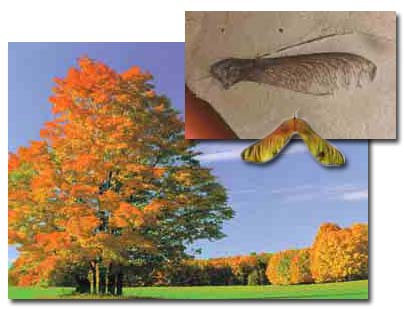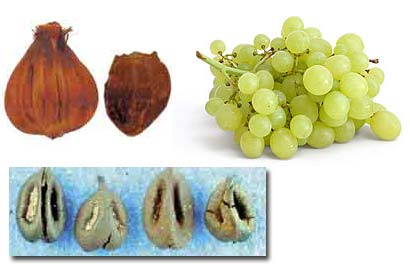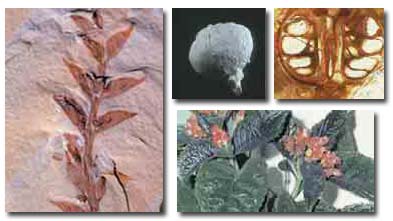Don’t you see that God sends down water from the sky and then in the morning the Earth is covered in green? God is All-Subtle, All-Aware. (Qur’an, 22:63)
 |
| At upper right, the fossil of a maple seed dating back to the middle Eocene (almost 60-65 million years ago) and a present-day maple seed. (“Acer stewarti;” http://lsweb.la.asu.edu/kpigg/acer.htm) Obviously, there is no difference between them. This is evidence that seeds have not evolved over time, but have been created in their present form by God. |
So far, we have given examples of different kinds of seeds, mentioning how plants produce and disperse their seeds. We’ve explained how the diversity of plants on Earth is thanks to the information contained in their seeds, enabling them to grow from the soil in the much same way for millions of years.
From this information, the conclusion to be drawn is that there is a perfect structure in seeds. So how have seeds with such an excellent structure come into being?
According to evolutionary theory, all living and non-living forms that exist on Earth – as well as the perfect order in the universe – are the result of coincidence. Plants, and accordingly seeds, have also come into existence by chance. But evolutionary sources give no clear information on the evolution of seeds.
Whichever evolutionary text we examine on the subject, we encounter a series of hypotheses, imaginary scenarios built on those hypotheses, inconclusive theories, and unrealistic charts, all based on these groundless claims.
When we examine the fossils of seeds, we can see clear evidence of creation. Seed fossils approximately 350 million years old (from the Devonian geologic period) have the same protective outer layer, embryo, and reserve of nutrients.58
 |
| Left: The fruit of the nipa palm, and a fossil of this fruit dating back to the Eocene (almost 65 million years ago). (Dr. Paul D. Taylor, Eyewitness Guides, Fossil, London, p. 36.) |
These seeds’ special structures have the same characteristics now as they did millions of years ago, having undergone no change to the present day – a very clear indication that they have not undergone any imaginary process such as “evolution.”
From time to time, evolutionist publications acknowledge the impasses concerning seeds, in confessions like this:
Many gaps exist in our present knowledge of seed development. More information is needed on... extension of the pollen chamber in cycads, role of the pollination drop, postpollination growth of ovules... structure of the megaspore membrane.59
From the above, we can draw an obvious conclusion.
Evolutionary theory is in as much of a deadlock over the emergence of plants and seeds as it is concerning other life forms on Earth.
These living things have been created by God. Seeds, as well as the plants that grow from them, have possessed all the mechanisms, complex systems and astonishing features in perfect form from the moment they first appeared.
Evolutionists use such terms as “developing over time,” “coincidental changes,” and “adaptations arising from necessity,” all assertions with no factual basis, and from a scientific point of view, meaningless.
 |
| (left) Fossil of this plant, with its flowers and fruits, is structured exactly like those of the present time. This fossil of the Archaefructus species is 140 million years old, the oldest known flowering plant fossil. The blue object at above left is a fossil of the fruit of crepe myrtle. The bottom picture shows the actual crape myrtle. At above right is a fossil of the same plant's seed dating to the middle Miocene (almost 22 million years ago).(“Shirleya grahamae Lythraceae;” http://lsweb.la.asu.edu/kpigg/mystery1.htm) |